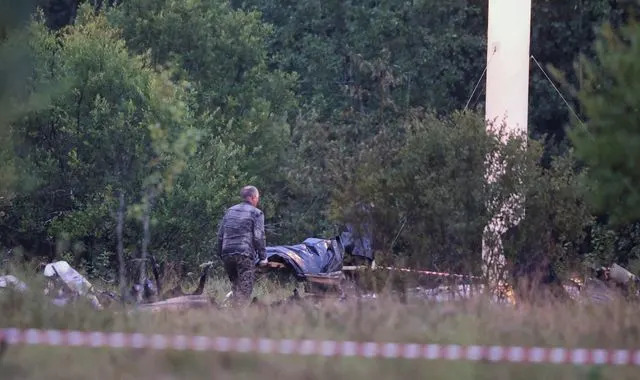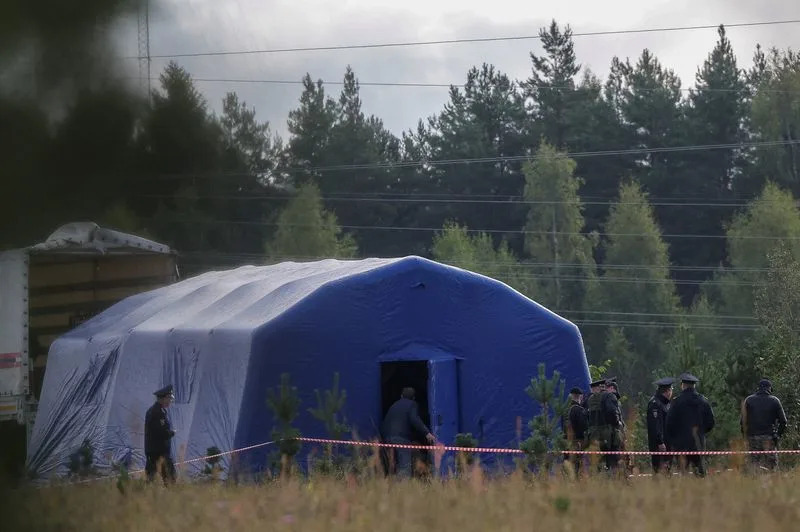Sky News
Updated Thu, 5 October 2023

Hand grenade fragments were found in the bodies of victims of a plane crash that killed former Wagner boss Yevgeny Prigozhin, Russian President Vladimir Putin has said.
Mr Prigozhin was reportedly among 10 people killed in a plane crash north of Moscow on 23 August, two months to the day after he led a failed mutiny against top Russian officials.
The aborted rebellion, during which he demanded the ousting of the defence minister, Sergei Shoigu, was the biggest challenge to President Putin's rule since he rose to power in 1999.
But Mr Putin appeared to dismiss Western assessments the plane had been shot down, claiming there was "no external impact" and this "is already an established fact".
"Fragments of hand grenades were found in the bodies of those killed in the crash," he told a meeting of the Valdai Discussion Club in Sochi.
He did not give any details around how a grenade could explode in the plane - but he said investigators should have tested the bodies for alcohol and drugs, given cocaine has been found at Wagner offices before.
"In my opinion, such an examination should have been carried out but it was not," he added.
Mr Putin said the FSB security service had found 10 billion roubles (£82.3m) in cash and 5kg of cocaine in searches of Wagner's offices in St Petersburg.
The investigators have not publicly commented on the case, but Russia said it confirmed Mr Prigozhin's death in the crash following genetic tests - without revealing the cause.
He was buried privately in a "farewell ceremony" in a St Petersburg cemetery in August, according to his press team.
What happened to the plane?
The private Embraer Legacy aircraft was travelling from Moscow to St Petersburg when it crashed, with Russia reporting there were no survivors.
Russian state-owned TASS news agency said seven passengers and three crew were on board the Embraer aircraft and were all killed.
A Telegram channel affiliated with the Wagner Group said Mr Prigozhin was killed in the plane crash. It called him a hero and a patriot who had died at the hands of unidentified people described as "traitors to Russia".
The plane came down near the village of Kuzhenkino Tver.
Western analysts and commentators have largely suggested President Putin could have ordered the killing of Mr Prigozhin, though no evidence has been presented.
Mr Putin - who Mr Prigozhin was once a close confidant of - described him as a "traitor" after the failed mutiny.
He had become a vocal critic of Russia's defence ministry and top generals in their handling of the invasion of Ukraine, eventually leading a revolt with a column apparently headed for Moscow.
The rebellion ended when Belarusian President Alexander Lukashenko stepped in to broker a deal, with Mr Prigozhin agreeing to relocate to Belarus.
What's the future for Wagner?
Before his death, Mr Prigozhin had cast Wagner as the world's most battle-hardened fighting force.
But the group's fate has been unclear since his death, with Mr Putin ordering its fighters to sign contracts with the defence ministry.
Mr Putin, when asked about the future of so-called private military companies in the country, said there is no consensus on whether these types of groups are needed.
"But today I can say for sure that several thousand fighters of this company have already signed contracts with the armed forces," he added.
"And if they want to, then they will take part in the fighting. They do this on the basis of signed individual contracts, which was not the case before."
He said it is a "complicated process" and remained ambiguous about the future of such mercenary groups.
Putin suggests plane of Wagner boss Prigozhin was blown up by hand grenades on board
Updated Thu, 5 October 2023

Aftermath of crash site of plane linked to Wagner's Prigozhin who was on passenger list
By Guy Faulconbridge and Vladimir Soldatkin
MOSCOW (Reuters) - Russian President Vladimir Putin on Thursday suggested that the plane crash which killed Wagner mercenary chief Yevgeny Prigozhin in August was caused by hand grenades detonating inside the aircraft, not by a missile attack.
The private Embraer jet on which Prigozhin was travelling to St Petersburg crashed north of Moscow killing all 10 people on board on Aug. 23, including two other top Wagner figures, Prigozhin's four bodyguards and a crew of three.
Putin suggested the plane was blown up from inside, saying that the head of Russia's investigative committee had reported to him a few days ago.
"Fragments of hand grenades were found in the bodies of those killed in the crash," Putin told a meeting of the Valdai Discussion Club in the Black Sea resort of Sochi.
"There was no external impact on the plane - this is already an established fact," Putin said, seemingly rubbishing assertions by unidentified U.S. officials who said shortly after the crash that they believed it had been shot down.
Putin did not give any more details about how a grenade or grenades could have been detonated on board, but said he thought investigators were wrong to have not carried out alcohol and drug tests on the bodies of those who died in the crash.
"In my opinion, such an examination should have been carried out but it was not," Putin said.
He said that in searches of Wagner's offices in St Petersburg, the FSB security service had found 10 billion roubles ($100 million) in cash and 5 kg (11 pounds) of cocaine.
The investigators of the crash have yet to report publicly on the cause. Neither Wagner nor Prigozhin's family could be reached to comment on Putin's remarks.
WAGNER'S FUTURE
Prigozhin died two months after leading a brief mutiny against Russia's defence establishment that posed the biggest challenge to Putin's rule since the former KGB spy came to power in 1999. Western diplomats say it exposed the strains on Russia of the war in Ukraine.
The Kremlin has rejected as an "absolute lie" the suggestion that Putin had Prigozhin killed in revenge.
The fate of Wagner has been unclear since Prigozhin's mutiny and his death, after which Putin ordered Wagner fighters to sign contracts with the defence ministry which Prigozhin and many of his men had opposed.
When asked about the future of so called private military companies in Russia, Putin said that as there had been no law on such groups, the experience of them in Russia had been "clumsy".
"We do not yet have a consensus in Russia about whether we need such formations or not, but today I can say for sure that several thousand fighters of this company have already signed contracts with the armed forces," Putin said.
"And if they want to, then they will take part in the fighting. They do this on the basis of signed individual contracts, which was not the case before," he added.
Before his death Prigozhin cast Wagner, which once had tens of thousands of men, as the world's most battle-hardened fighting force.
He accused Putin's top military brass, Defence Minister Sergei Shoigu and General Staff Valery Gerasimov, of incompetence and warned that Russia could lose the war in Ukraine unless it raised its game.
Putin said it was the defence ministry which had originally asked him to approve the use of Wagner in Ukraine - and that its men had fought heroically.
He was ambiguous about the future of private military companies, and their standing in Russian law.
"This is a complicated process, we are discussing and thinking about it," Putin said.
"In many countries, such companies exist, are actively working and, above all, they work abroad, we all know this well. Whether we need them or not, we will think about it."
(Editing by Andrew Osborn and Mark Trevelyan)
No comments:
Post a Comment